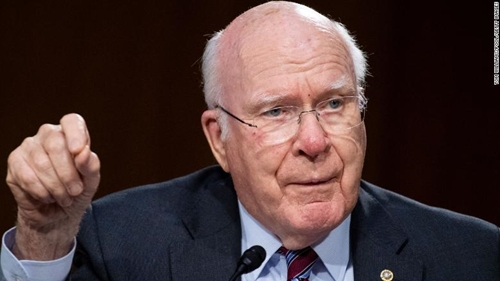Looking back at his support for Vietnam to overcome the consequences of the war over the past 33 years, starting even before the two countries normalized relations, Senator Leahy underlined that he has so many memories, beginning with his first visit to Vietnam shortly after 1989 when he established the Leahy War Victims Fund.
Accordingly, he visited a clinic where support from the U.S., provided through the humanitarian organization Vietnam Assistance for the Handicapped, was providing wheelchairs and artificial limbs to Vietnamese who had been severely disabled from injuries suffered during the war. Seeing the difference they could make by helping those people regain their mobility and support themselves made a lasting impression on him. Since then, the fund has established programs to assist people with disabilities caused by landmines and unexploded bombs, and exposure to dioxin, to eight provinces, and they are in the process of expanding programs to two more provinces.
    |
 |
|
U.S. Senator Patrick Leahy (Photo: CNN) |
Another vivid memory he has is being with Sr. Lt. Gen. Nguyen Chi Vinh, former Deputy Defense Minister at the Da Nang dioxin remediation site, where the U.S. and Vietnam cleaned up the contamination that was poisoning the soil at and around the airport. Gen. Vinh was an invaluable partner to him. Senator Leahy said that without the general’s recognition of the importance of addressing the human consequences of the war, his compassion and commitment, and his willingness to work closely with him, relations between the two countries could not have progressed as they did. His wife Marcelle and he often think of Gen. Vinh as a close friend and partner. On March 23, 2021, he made a statement for the Congressional Record paying tribute to General Vinh.
When he was asked to describe the cooperation in overcoming the consequences of war as an important foundation in Vietnam - U.S. relations, Senator Leahy held that it began in the 1980s with Vietnam’s help in locating the remains of American MIAs. That help was indispensable, and it has continued ever since. It led to the programs to assist people with disabilities, to locating and destroying unexploded ordnance, the cleanup of dioxin contamination, and to a program that began last year to identify the remains of some of the hundreds of thousands of Vietnamese who remain missing from the war. Each of these programs has been an important building block in the foundation of U.S. - Vietnam reconciliation and cooperation, that has opened the door to cooperation in many other areas, from regional security to higher education, climate change, and public health. Without working together to address the human consequences of the war, the process of reconciliation would not have advanced as it has, and they would not have been able build the trust and understanding to expand our cooperation to these other areas.
According to the U.S. Senator, the two countries have made long strides in cooperation in overcoming the consequences of war. During President Biden’s visit, the U.S. and Vietnam upgraded partnership to a comprehensive strategic partnership. This would not have been possible without the pathbreaking efforts of former U.S. veterans like John Kerry, John McCain, and Bobby Muller who led the first group of U.S. veterans back to Vietnam in 1981, and their Vietnamese counterparts. It was the vision and determination of people like them, as well as humanitarian organizations like Vietnam Veterans of America Foundation, that opened the door to address the consequences of the war. Although Senator Leahy did not serve in Vietnam, he vividly remembers the war; he opposed the war, and in his first year in the Senate he voted to cut off funding for the war. The opportunity, years later, to help address some of the worst consequences of the war for the people of Vietnam as well as the U.S., and to build a new relationship between our countries, was among the most meaningful and rewarding experiences of his 48 years in the Senate.
In his opinion, for partnerships to succeed, especially between countries with very different cultures and histories and who were once fierce enemies, each party needs to take concrete steps to strengthen the partnership. Both sides have made great progress together, but they have to go further. Today and in the future, some of the biggest challenges for the two sides are global warming and regional security. They are already seeing the environmental and human costs of climate change. If they do not dramatically reduce carbon emissions, the consequences for Vietnam, the U.S., and the world could be catastrophic.
Both countries share a common respect for, and commitment to, the principles of sovereignty and international law which promote stability. They should pursue new opportunities to jointly reinforce this commitment.
In addition, the two sides need to find ways to address differences so that they can become stronger partners. That is how they will achieve their shared goals of peace and prosperity for their people.
Reported by Chung Anh